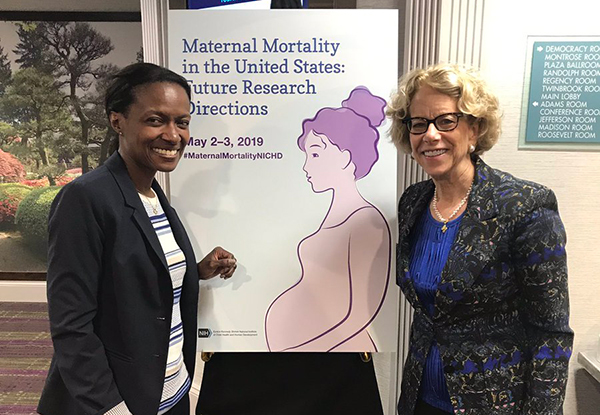
With participant Cynthia Giamfi-Bannerman, M.D., of Columbia University, before the workshop
Source: NICHD staff photo
May is a time of transitions: spring gives way to summer and, for many high school and college graduates, a new phase in life awaits.
Earlier this month I had the honor of delivering the commencement address to the University of Maryland School of Medicine graduates, and it reminded me of what a special time of transition this is for so many families. For the newly minted M.D.s, my speech focused on three major technological advances that have occurred in my practice lifetime: the personal computer, DNA sequencing, and artificial intelligence. One thing that hasn’t changed, and will not change, is the power of human touch, as well as listening and observation skills, and their importance in providing optimal patient care.
Taking Action to Improve Maternal Health
May 2019 began with an NICHD workshop on maternal mortality, focusing on the research needed to reverse the increasing rates of both maternal mortality and severe maternal morbidity. In addition to the need for better data, much of the discussion centered on health disparities and how to reach populations that are disproportionately affected. Maternal mortality continues to be a high priority for NICHD and across the Department of Health and Human Services (HHS), and we are engaged in conversations with other HHS agencies, such as Centers for Medicare & Medicaid Services, on how our research can improve maternal health.
I recommend you take a look at our Maternal Mortality topic on the NICHD website to learn more about what we are doing to address this issue.
Friendly Reminder About the Strategic Plan
I also had the opportunity to give my annual presentation to the Friends of NICHD, an independent coalition of organizations that support NICHD’s mission through Congressional awareness and advocacy. I shared some recent advances in NICHD-funded research as well as updates on NICHD and trans-NIH initiatives of interest to the group, such as the HEAL (Helping to End Addiction Long-TermSM) Initiative and the continuation of the Task Force Specific to Research on Pregnant Women and Lactating Women (PRGLAC). The group was also quite interested in updates on our strategic planning process, along with a timeline for the next steps.
Speaking of which, the Strategic Plan is coming along quite rapidly now, and we plan to unveil the final version in September 2019. In the meantime, though, I invite you to tune in to the next NICHD Advisory Council meeting on June 11 to hear our revised Mission and Vision statements, proposed by a working group of our Advisory Council. The heart of all that we do here at NICHD will remain the same, but these updated statements provide a fresh and more succinct articulation of our research and overarching purpose.
Commemorating Be Best
This month marked the one-year anniversary of First Lady Melania Trump’s Be Best initiative, and I attended a celebration at the White House marking the occasion. The pillars of her campaign, child well-being, online safety for children, and helping children affected by opioid abuse, also align with some of NICHD’s research priorities. Special guests at the ceremony included NIH Director Dr. Francis Collins, who spoke about the importance of wellbeing in children, as well as several children staying at The Children’s Inn at NIH who are participating in NIH clinical research protocols.

 BACK TO TOP
BACK TO TOP